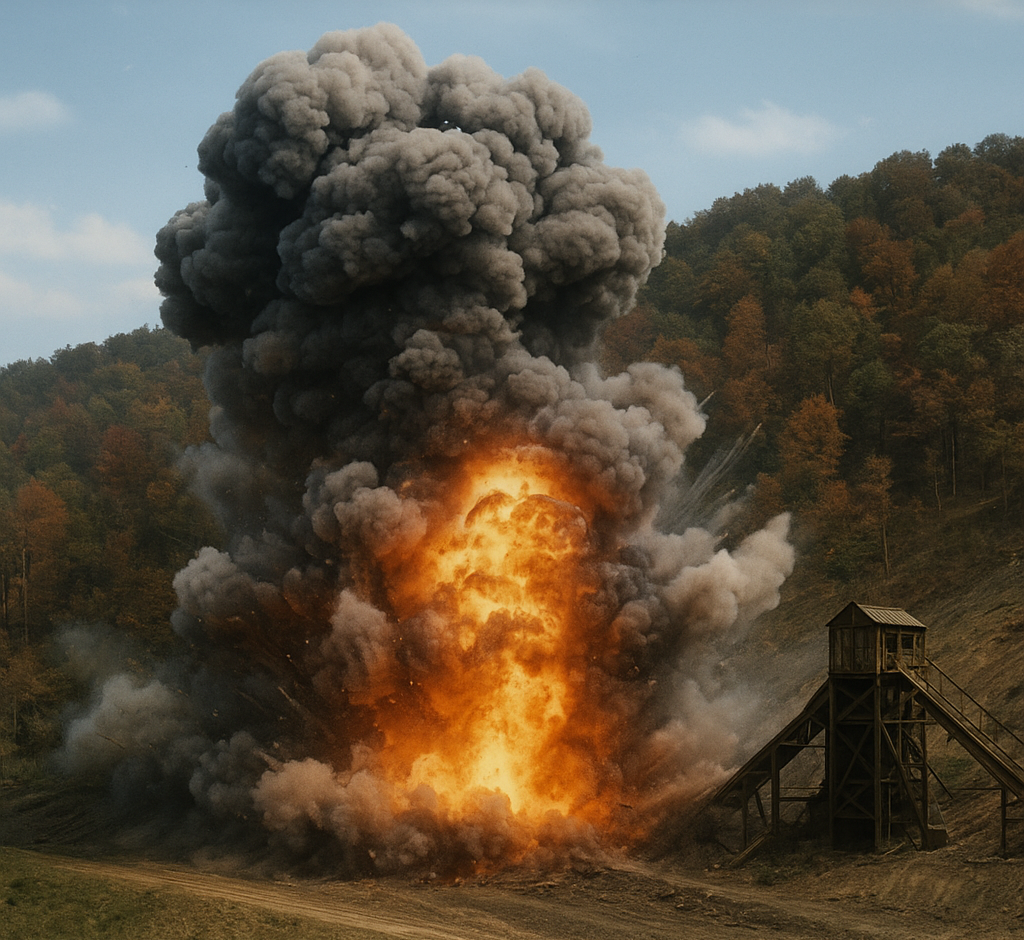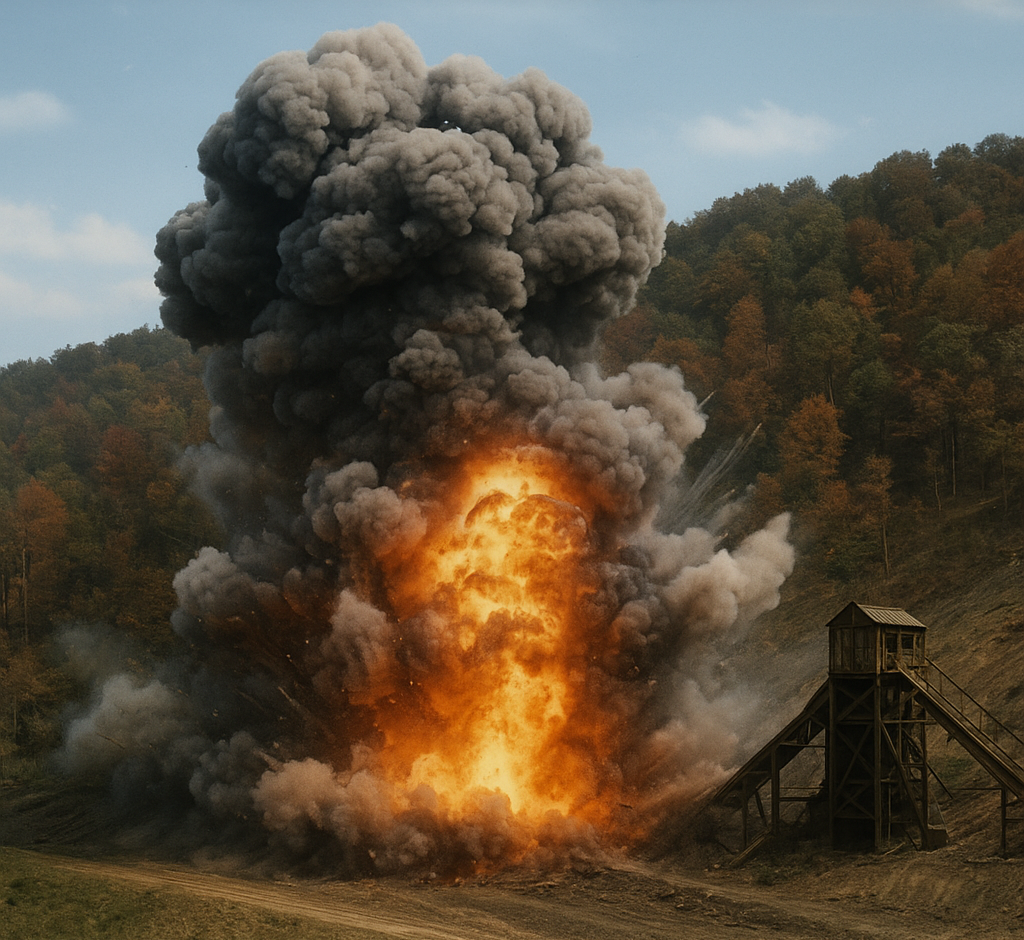Chapter One

November 13, 1954, started like any other fall morning in West Virginia. The crisp air carried the fragrance of chimney smoke and the distant sounds of life. The sun beamed high above us while disaster brewed beneath the earth. Papa mined coal nestled in the Appalachian Mountains, where men and machines toiled beneath the rocky soil.
Tugging on Mama’s sleeve, "Why is Papa still home?" I quietly asked, "Wasn’t he supposed to be working?" Morning light spilled across the worn wood floor.
"He isn't feeling well, dear." Then, an enormous boom rattled our house. Mama grabbed the table, spilling her tea. Papa, who had been lying asleep on the couch with his eyes closed, jumped up, his hand instinctively reaching for his jacket. He rubbed his red, puffy eyes, and off he ran.
"Where were my boots?" he shouted. Then he nearly tripped over them as he turned the corner. "Never mind, I found them." Without tying a single lace, he went out the door. The screen door slammed behind him.
The collapse of Mine No. 9 had a significant impact on everyone. Papa took his co-workers’ loss the hardest. I had never seen him or Mama mourn before. Shortly thereafter, our family packed up our few belongings and left. We relocated to a different mining town because of the suspension of all ongoing mining activities. Employment opportunities were limited, but Papa had a strong reputation in this region. We joined my best friend, Rachel, and her father, Rogan, at the mine where they lived. The boxes were heavy, filled with memories and the unspoken hope of a fresh start.
In the evenings, at our new home, Mama kept things light while sewing me a fresh coat as my old one was too small and worn out. Papa embraced the familiar calmness of home. He often sat on the front porch steps in the evenings, puffing on his pipe. He seemed lost in his thoughts as he gazed out at the neighboring mountains. It was a faithful tradition before bed and work.
The wool for my coat had a faint lavender scent mixed with a sharper, metallic odor from the dye. The scent of freshness clung to her hands, a testament to her tireless efforts. I often felt drawn to the scraps of fabric, as if they held a silent story. Mama said I inherited her curiosity. Sometimes, I could hear a faint melody drifting from somewhere far away, a tune I couldn’t place but felt deep in my bones. Mama sang hymns while she sewed, but lately she had been off-key.
One morning, I received my newly sewn coat. "Oh, thank you, Mama." The wool felt warm on my skin.
“Abigail, I used black and brown wool to help minimize the visibility of coal stains." It was rare for her to address me by my name. I reached over and gave her a tender hug and a kiss. “Can you please put away the sewing materials for me?” she asked.
I reached for the basket, careful not to bump the sewing machine. As I reached in, my fingers brushed against something stiff and unfamiliar tucked beneath a pile of blue flannel. It felt out of place, rough against the soft wool and comforting cotton. It was a small badge.
“Mama, what’s this?” I held it up. Threads of crimson and gold held to my fingers, a vibrant contrast against the dull star in my hand. It felt important somehow, like a secret whispered from a forgotten time.
Mama’s hand froze. Her knuckles turned white as she gripped her mug. A sense of panic swept over her face as it drained of color. She averted her gaze. She looked away, toward the grimy windowpane.
“We became your parents,” she said, her voice soft. "When you were just an infant. Your… birth parents weren’t able to care for you after World War II." She paused. “Things happened. Far away. Things that changed everything for many families. Your parents were prisoners of war who never came home."
She explained briefly and hesitantly about families torn apart and children hidden away. I asked about it, wanting to understand, and she spoke of unimaginable suffering and the courage of people who risked everything to protect others.
“Honey, that’s why you had that star. It was a sign of who you are, where you came from, and your heritage.” While sobbing, Mama told me about a terrible man named Hitler, who marked my people for death and destruction.
Then Mama handed me a photograph, she kept in her Bible. “Did you ever meet them?” I asked, pointing to the picture. “Yes,” she replied, her voice thick with emotion. “A time long ago. Those memories were bittersweet. I knew them. Your mother was my childhood friend before I moved here from across the sea.”
While tracing my fingers over the couple in the picture, “Mama, I love you and Papa, but my heart ached for something I never had.”
Holding the basket, I knelt by Mama’s chair. The scraps now seemed to hold an even deeper story, one of loss and survival.
“Please put away the badge,” Mama said. "It’s a reminder of a deep and enduring sorrow, not from so long ago."
I hesitated, then placed the star in her hand. I still felt the need to understand, to connect the star with the story that lay hidden within it.
“Mama,” I whispered and cried, "will you sew it onto my coat?” She reluctantly agreed. Her hands shook as she carefully stitched the badge onto the right side. The needle glistened in the light, a tiny spark against the backdrop. “Why didn’t you and Papa share this with me earlier?” Our hands trembled as we both cried.
“Sweetheart, you are special to us; never forget that. We wanted only to protect you.” I pressed my face against her shoulder and hugged her. She held me tight as I closed my eyes. The scent of lavender and cherry tobacco wrapped around me, a silent hope of a safer future.
